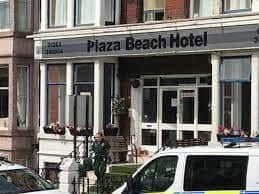Blackpool death trap hotel owner is sentenced as court told Blu Tac was shoved into fire alarm system to stop the noise
and live on Freeview channel 276
Aheed Sultan, 76, of The Avenue, Loughton, Essex, allowed a policy of 'wedging 'fire doors on the 'open' position at the five storey Plaza Beach Hotel on Albert Road, formerly known as the Silver Beach Hotel.
Lancashire Fire and Rescue Authority mounted a prosecution following an inspection of the hotel, which he had leased since 2015, brought about by a raid by the Gangmaster and Illegal Labour Agency and other agencies in 2017.
Advertisement
Hide AdAdvertisement
Hide AdWhile it was listed as a hotel, it was effectively being run as a house of multiple occupancy, with many residents having lived there for a significant time.


A fire officer found a number of inadequate escape routes, combustible materials including a mattress on escape routes, and an exit was covered with curtains and seized shut.
The fire alarm system was faulty in several areas and a lump of Blu Tac had been pushed into the area activating the alarm in order to stop the noise.
Emergency lights had no power, fire safety doors were missing self closing devices, and some fire doors were wedged or stuck open.
Advertisement
Hide AdAdvertisement
Hide AdDespite requests, Sultan, who had ran three hotels in Blackpool for a number of years, did not attend any interviews with the fire service.
Since the inspection the defendant has developed cognitive problems, and Preston Crown Court was told his son, a qualified doctor, now holds power of attorney over his affairs.
Defending, Adam Lodge said he was not fit to attend the proceedings.
Prosecuting, Joe Hart gave a list of the flouts and described it as "a premises where little or nothing had been done in respect of fire safety" and that people would have been at risk or injury or death.
Advertisement
Hide AdAdvertisement
Hide AdHe added: " The Crown say the extent of the breaches in a high risk environment like a hotel amounts to a wilful blindness to the risks, particularly the failure to prepare any kind of risk assessment."
Sultan previously admitted a string of seven fire safety flouts on the basis the hotel was undergoing refurbishment at the time and how two other hotels were found to have adequate measures.
The charges encompass his failure to protect employees, to maintain adequate fire separation, to provide detectors and alarms, to ensure adequate escape routes, to remove combustible materials and provide closing fire doors, to put appropriate locks in on doors, and to provide emergency lighting.
On the day the fire service went in to inspect the premises, a family was still trying to check into the hotel as they were considering closing it.
Advertisement
Hide AdAdvertisement
Hide AdMr Lodge argued while there was a risk of death it was a "very low risk of death" and that Sultan had not been turning a blind eye to things.
He said: "Clearly at the time of this investigation the hotel was in a very poor state of affairs.
"At the time of these offences it is now apparent the defendant was already suffering some sort of deteriorating mental health. Your Honour may accept his age and his health has played its part in the deterioration of the hotel."
Information had been provided to the court about his assets claiming there was an unpaid tax bill from 2014 to 2016 of £207,763 but information about hsi savings was
Advertisement
Hide AdAdvertisement
Hide AdThe court has to take financial affairs into account when sentencing but Judge Philip Parry said he had been left in the dark about much of his finances.
Imposing a £7,700 fine and a £7,300 contribution to Sultan's £24,394 costs bill, he called it a "troubling example of its kind" and said the charges show he didn't pay adequate attention to the responsibilities he bore for fire safety in relation to his long term let residents.
He added: " When people treat a building such as this as their home they put their trust in the person responsible for running it that their home is protected.
"Also when people sleep in premises they are at heightened risk so far as fire safety is concerned, simply because they are asleep."
Thanks for reading. If you value what we do and are able to support us, a digital subscription is just £1 for your first month. Try us today by clicking here.
